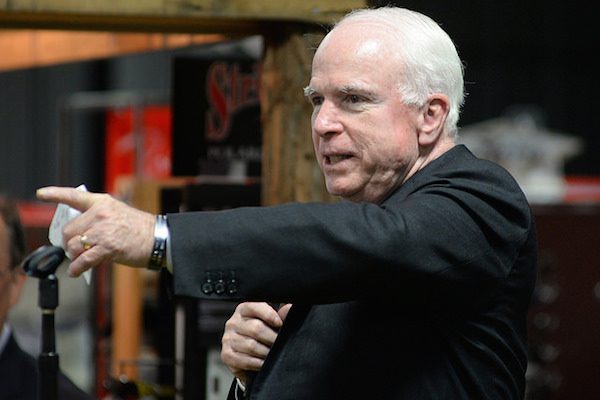McCain’s Embarrassing Recklessness on Display

Dana Milbank reproduces a notable exchange from the Senate Armed Services Committee hearing on Syria:
“We have the military capacity to impose a no-fly zone,” Selva said without hesitation. But he was concerned about the Syrian and Russian reaction. “The potential for miscalculation and loss of American life in the air,” he said, “do not warrant the no-fly zone.”
Sen. John McCain, the panel’s chairman, shook his head. “It is one of the more embarrassing statements I have ever heard from a uniformed military officer,” the Arizona Republican said, “that we are worried about Syria and Russia’s reaction to saving the lives of thousands and thousands of Syrians being barrel-bombed and massacred.”
McCain is the one who should be embarrassed by this exchange, but it doesn’t surprise me that he wasn’t. There is no military option so reckless or dangerous that McCain wouldn’t support it, and it is fortunate that our military leaders are not quite so cavalier about risking American lives and possibly provoking major wars. Thinking through how potential adversaries might react to a course of action is the responsible and sane thing for anyone in the government to do whether he is a military officer or a civilian. Gen. Selva is doing what he ought to be doing under the circumstances, and McCain ought to be ashamed for upbraiding him for offering a sober reckoning of the potential costs and benefits of his preferred policy. In this case, it is also absolutely right to be cautious when talking about an aggressive measure that puts the U.S. on a collision course with another nuclear-armed state. McCain’s characteristic disregard for the consequences of military action is what Milbank should be condemning here rather than faulting Pentagon officials for being responsible.
It also needs to be emphasized here that starting a war with the Syrian government and risking war with Russia wouldn’t guarantee the protection of any civilians in Syria. No only would a “no-fly zone” fail to offer any protection for civilians from ground attacks from the regime or ISIS, but it would risk escalating the war to the detriment of civilians in all parts of Syria. If a “no-fly zone” were to trigger a wider war, the consequences could be even more severe for all parties to the conflict. As hawks typically do, McCain dismisses the possibility that an aggressive policy might backfire or cost more than it gains the U.S. He is the one ignoring the perils and pitfalls of deeper intervention, and it is simply deplorable.
Instead of challenging it, Milbank wants to encourage this lousy attitude that McCain displayed:
If not for the caution, there could potentially be a consensus approach to the Islamic State involving safe zones and a more U.S. ground troops – not enough to give Islamic State propaganda value but enough to induce potential allies to cough up ground troops of their own [bold mine-DL].
This is a fantasy, and one that hawks are eager to promote because it offers a way to pretend that the U.S. can escalate the war at relatively low cost. Just propose a small ground force to fight in Syria, they say, and our “potential allies” will provide the rest. It’s not true. The trouble is that none of the people saying this has the first clue how to “induce” other states to send their people to fight in Syria, and that’s probably because it isn’t going to happen. The U.S. can send its soldiers to fight on the ground in Syria, but if this administration or the next were to do something so foolish it would need to be done with the understanding that our forces would be there fighting and dying almost entirely on their own. Our “potential allies” in this fight will always be just that–potential–and they aren’t going to make the contributions that almost everyone acknowledges the U.S. shouldn’t have to make by itself. Bemoaning the caution of Pentagon officials while ignoring these realities, as Milbank does, in the worst sort of “do something”-ist commentary, and it only worsens the quality of the debate about what U.S. policy should be.